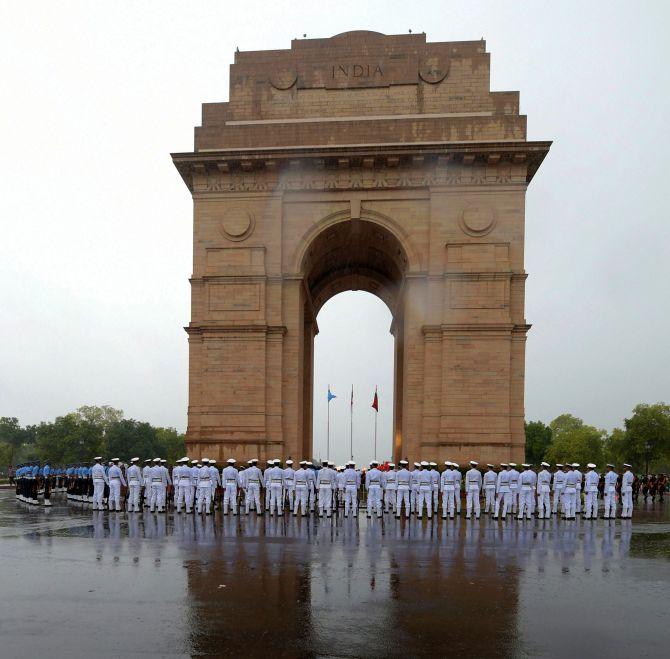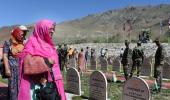 IMAGE: Squadron Leader Ajay Ahuja's body being carried by Indian Air Force officers for the ceremonial guard of honour in May 1999.
IMAGE: Squadron Leader Ajay Ahuja's body being carried by Indian Air Force officers for the ceremonial guard of honour in May 1999.Squadron Leader Ajay Ahuja was tortured and killed after his MiG-21 was shot down and he ejected across the Line of Control during the Kargil war.
Wing Commander C H Bal Reddy (retd) identified his mortal remains and brought the coffin home.
He tells Rediff.com's Archana Masih about the Indian hero we must not forget.
As India celebrated Wing Commander Abhinandan Varthaman's return, there were many who thought of the Indian Air Force pilot who did not return.
Squadron Leader Ajay Ahuja's MiG-21 was shot down by a Stinger missile as he tried to locate Flight Lieutenant K Nachiketa after the latter ejected into Pakistan occupied Kashmir in the early days of the Kargil War in 1999.
Then Flight Lieutenant Nachiketa was returned after eight days of captivity. He retired from the IAF as a group captain recently.
Squadron Leader Ahuja was tortured and killed. Three days later, his body was handed over by Pakistan to the Indian Army at a border check post.
Bal Reddy, a young officer from Squadron Leader Ahuja's squadron, identified the body and brought his mortal remains home.
Now a pilot who flies for Indigo Airlines, nine years after leaving the IAF, he remembers that day clearly nearly 20 years later.
"Till the time I saw his body, I held the belief that Ahuja sir would survive and return," says the officer who left the IAF after 14 years of service.
"Even when I saw the coffin, I thought it looked too small to accommodate his frame -- but when it was opened I sadly realised it was him," Wing Commander Reddy (retd) says over the phone from Hyderabad.
He had met Squadron Leader Ahuja minutes before he took off on what would be his last strike mission the morning of May 27, 1999.
He remembers handing him an envelope containing some money that Mrs Alka Ahuja had sent for her husband.
Mrs Ahuja and her eight-year-old son were at the air force station in Bathinda where Squadron Leader Ahuja was stationed.
The squadron had moved to Kashmir during the Kargil War and Flying Officer Reddy was instructed by the commanding officer (Present Chief of the Air Staff Air Chief Marshal Birender Singh 'Tony' Dhanoa) to bring a MiG-21 to Srinagar.
Last year, the chief of the air staff honoured Squadron Leader Ahuja and other Kargil martyrs by leading a 'Missing Man' formation. The aircraft formation has a gap between the jets depicting a missing brother-in-arms.

In the post mortem room, then Flying Officer Reddy saw that Squadron Leader Ahuja's G-suit had been removed and he only had his overalls on. His badges had been ripped off.
But inside his overall pockets the cash that his wife had sent was still intact in the envelope. He had two gun shot wounds, his body told signs of torture.
Then Flying Officer Reddy used Rs 1,300 to pay for a coffin. In an account published on defencelover.in, he recalled that the scale of the Kargil War unfolded before him at the Army Base Hospital.
The war had just begun, the logistics were still not in place and coffins were being made at a very slow pace in the workshop.
By the end of the war on July 26, 1999, 527 Indian soldiers sacrificed their lives and were sent home in coffins draped in the national flag.
'As the need for the coffin wasn't an internal army demand at that time, the manager asked me to pay. I wasn't carrying my wallet and was rescued by Ahuja sir's cash,' wrote Wing Commander Reddy.
As a young fighter pilot, he had hoped to fly missions against the enemy, but Wing Commander Reddy's mission for the next few days was looking after the funeral and post-demise paperwork.
It was a mission he dedicated himself to completely.
"An ejection is a life changing moment for a pilot," says Wing Commander Reddy. "Flight Lieutenant Nachiketa could not get into a fighter cockpit again and Ahuja sir did not return."
Mrs Alka Ahuja, Squadron Leader Ahuja's wife, was provided a petrol pump in accordance with the policy for the next of kin of Kargil martyrs. She moved to Delhi.
Their son Ankur graduated from the Delhi School of Engineering and now works in Gurgaon.
When Rediff.com contacted Mrs Ahuja, she politely responded that it would be difficult to speak about her husband.
In an earlier television report on her husband's sacrifice she said she had been advised not to see her husband's face for the last time.
In hindsight, she said in a voice quivering with grief, that it was a sound decision because she believed one day she would see his smiling face again.
As we salute our martyrs, we must salute the courage of those closest to them.
Squadron Leader Ahuja was awarded a Vir Chakra posthumously.
Mrs Ahuja was present when Air Chief Marshal Dhanoa led the 'Missing Man' formation last year and was presented with a plaque of the formation.
As India and Pakistan came to the brink of war again last fortnight, Wing Commander Bal Reddy, who now flies for a commercial airline, thought India did the right thing by crossing the Line of Control, unlike during the Kargil War.
"The pilots's hands were tied behind their backs during Kargil which was redressed with Balakot," he says, and has advice for the media.
The media does not give enough credit to the security personnel sacrificing their lives in Kashmir and the north east, he feels.
"Reports do not even highlight their names," he says. "It is the duty of the media to inform the nation about every security person who is martyred -- whether he is an officer or jawan -- and whether he is on land, air or sea."










